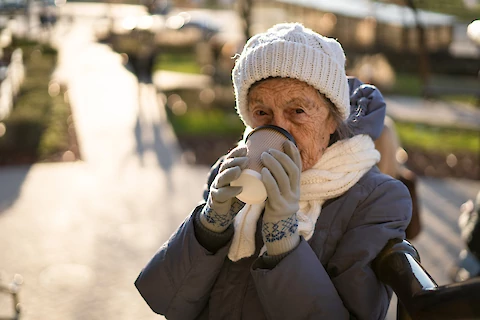
When it comes to senior health, adequate hydration is key. As we age, our sense of thirst diminishes, making seniors more susceptible to dehydration. Despite the prevalent misconception, dehydration isn't only a concern during hot weather; winter is also a critical period for maintaining hydration.
Read on to learn about the importance of winter hydration for seniors, and explore practical ways to maintain optimal fluid intake to ensure their well-being during the colder months.
Why Winter Hydration for Seniors Matters
Seniors are often at a greater risk of dehydration due to various aging-related physiological changes. One such change is the diminished sense of thirst, which can lead to insufficient fluid intake. Certain medications can also increase the risk of dehydration. Central heating, a staple in many homes during winter, further contributes to dehydration, as it can dry out the body.
Winter weather often changes your daily routines and habits, which can inadvertently result in less fluid intake. For instance, you might drink less water because you don't feel as thirsty. Some people try to limit trips to the restroom during the night because they don't want to get out of a warm bed. All these contribute to greater dehydration risks among the elderly.
Practical Hydration Tips for Seniors
Incorporating more fluids into one's daily routine doesn't have to be a daunting task. Here are a few practical suggestions to maintain winter hydration for seniors:
Drink Small Quantities Regularly
Instead of trying to drink a lot at once, sip small amounts of fluids throughout the day. This can make it more attainable to reach adequate hydration levels.
Try Warming Up Your Beverages
Hot beverages like herbal tea or hot water with lemon are great for keeping up with your fluid intake during the winter. Aside from keeping you hydrated, they also help keep you warm.
Eat Hydrating Foods
Consuming fruits and vegetables with high water content, like cucumbers, oranges, and strawberries, can also help maintain winter hydration for seniors. Remember, the goal is to make hydration a habit. It might take some time, but the health benefits make it worthwhile.
Recognizing Signs of Dehydration in Seniors
Recognizing the symptoms of dehydration in seniors can help prevent serious health complications. Common signs include:
- Dry mouth
- Fatigue
- Dizziness
- Confusion
Dehydration can lead to low blood pressure and rapid heart rate in severe cases. If you notice any of these symptoms, increase fluid intake immediately and seek medical attention if symptoms persist.
Get Support From Senior Helpers This Winter
Keeping our senior loved ones hydrated in the winter is not about forcing them to drink large quantities of fluids in one go. Ensuring regular intake of small amounts of fluids throughout the day and focusing on eating foods with a high water content can also help. Caregivers should also be on the lookout for signs of dehydration in his or her senior and act promptly if they appear.
The caregivers at Senior Helpers Chattanooga provide additional guidance and support for seniors and their families in Chattanooga, Hixson, Cleveland, Red Bank, and Ooltewah. We also offer a range of in-home care services to help seniors live healthy and fulfilling lives. Contact us if you'd like to learn more!